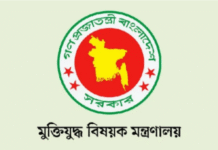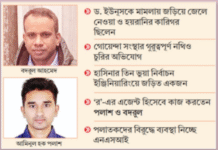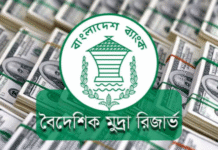
The economy, it seems, is in a sort of limbo, neither fully on recess nor roaring ahead.
While power and energy consumption has risen sharply since the easing of movement restrictions on May 30, the other indicators, most notably retail sales, are blowing hot and cold, all of which suggests the full recovery is far away.
People are flocking to stores but they are not spending, posing risks of a tidal wave of infections after Eid-ul-Azha and subsequently delaying the economic recovery.
“But there are not many shoppers,” said Shams Mahmud, president of the Dhaka Chamber of Commerce and Industry (DCCI).
The reason being, many have seen their salaries reduced owing to the pandemic.
The cottage, micro, small and medium enterprises, which have a big role in the economy and job creation, are still suffering.
Besides, the global situation is yet to become normal as the risk of a resurgence of Covid-19 remains.
“It is a tricky situation. Good thing is that orders are gradually coming,” he said.
Daily generation data from the Bangladesh Power Development Board (BPDB) showed that electricity usage has been increasing gradually since April, the first month of the countrywide shutdown to fight the coronavirus disease.
A 10-day average of usage showed that daily average electricity usage rose to 235 million units, or kilowatt-hour units, in July from 153 million units in April. Average daily consumption was 245 million units in July last year when businesses had been normal.
BPDB Chairman Belayet Hossain said generation and consumption of electricity have increased as everything, including industries, were reopening gradually.
Consumption of gas rose to 1,700-1,800 million cubic feet per day (MMCFD) after the removal of the shutdown since June, data from Titas Gas Transmission & Distribution Company showed.

Average daily gas consumption had dropped to 1,320 mmcfd during the shutdown period from an average of 1,777 mmcfd before 25 March, according to data from Titas, which has nearly 60 per cent share in gas sales.
The volume of consumption was almost similar last year, said Rana Akbar Haidary, director operations of Titas, which operates in the country’s major industrial and commercial regions greater Dhaka and Mymensingh.
“It appears that industries are using gas and they have resumed full-fledged production,” he said.
Sales of petroleum, including diesel and jet fuel, are improving, said Murshed Hossain Azad, deputy general manager of state-run Bangladesh Petroleum Corporation, the sole importer and refiner of petroleum products.
Economic activities have started recovering compared with March-May, said Khan Monirul Alam Shuvo, chairman of the PR standing committee of the Bangladesh Garment Manufacturers and Exporters Association.
Export has begun to make a turnaround and July may see some more recovery, he said.
There has always been a sudden rush in production or shipments before holidays and a good portion of the recent shipments maybe the clearance of stocked or cancelled goods.
“So, we can’t say for sure that this trend will sustain, although we hope it will,” he added.
The gradual rise of usages of electricity, petroleum and gas since April to July is a good indication of the economy’s return to normalcy, said Khondaker Golam Moazzem, research director of the Centre for Policy Dialogue.
“However, these positive changes need to be interpreted carefully.”
The use of energy and power is still behind the level of last year’s that portrays that most of the sectors are yet to reach their last year’s level.
At the same time, consumption of power and energy widely varies between industries because of the difference in the level of demand for power and energy, the scale of operation and affordability in this crisis period due to supply chain disruptions, the economist said.
The sectors and activities where consumption and demand are growing both at local and global markets are benefiting more from the revival of economic activities.
Firms that have received support from the government’s Tk 103,117 crore stimulus packages are also benefiting, Moazzem said.
Major companies involved in essential product markets are likely to be the major beneficiaries, he said.
A large segment of informal industries, services and other activities have resumed operations but they seem to be running at a much lower level of their capacities and the stimulus package did not help them.
“Consumers are yet to get ready to spend beyond their emergency needs due to the uncertainty in jobs and income and health risk. A full-fledged economic recovery will be needed some other essential things that are beyond the full consumption of power and energy,” Moazzem said.
The increased usage of energy is a reflection of resumption of economic activities, said Selim Raihan, executive director of the South Asian Network on Economic Modeling (SANEM).
“We still have a long way to go before we can see the pre-COVID pace of economic activities,” he said.
He went on to cite the export-oriented garment, leather and domestic market-oriented steel, food-processing and transport sectors that are not running in full scale yet to further his point.
“Even, we do not see a huge number of people going home to celebrate Eid that we saw in the past.”
Private investors are trying to cope with the situation instead of making further investments, said Raihan, a professor of economics at the University of Dhaka.
“It appears that they are trying to reach the pre-crisis level. None is operating at their full capacity and overtimes bills are not generating in many garment factories.”
Referring to the SANEM’s ongoing survey among 300 factories, including 50 garment industries, he said businesses expected a better situation in the July-September quarter compared with the April-June quarter.
“I think businesses are very cautious. They are not too much optimistic but there is progress.”
Asif Iqbal, a deputy managing director at Meghna Group of Industries, said except essentials, consumption of all products declined.
“It is clear that people are buying less. Disposable income is still a big challenge. People are spending less and saving more,” he added.
From the perspective of sales, the recovery is far from normal, said Rupali Haque Chowdhury, president of the Foreign Investors’ Chamber of Commerce & Industry.
“Good thing is economic activities are increasing gradually and consumers are coming to shops. We expect consumers are coming out following health guidelines. We may be able to recover fast if health guidelines are followed properly.”









